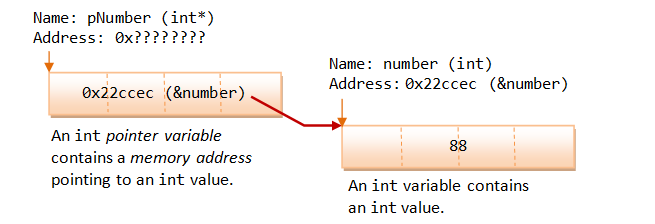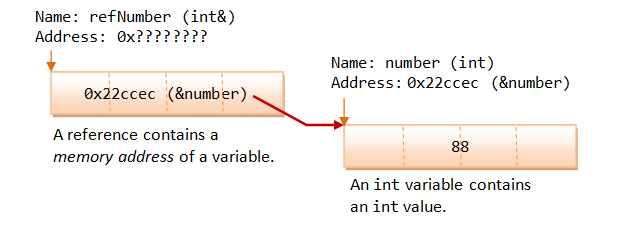Object reference vs pointer
Pointer variable
Let's start from the beginning, computer memory location are layered out in addresses, each particular location have an address and holds some kind of content. The address is a numerical number usually in hex for easier expression.
To help programmer, instead of using the hex address remembering them, variable are created as a named location. So instead of using the numerical address, you use a name that is attached to that particular location.
As you can see the variable sum, age, average, ptrSum are all named location in replacement of using the direct address.
Integer type variable holds integer value.
Double type variable holds float value.
Pointer type variable holds memory address value. It is just like any other variable that holds a value.
Pointer
You declare them by using the * symbol like so:
type * ptr;When they are declared they usually have garbage value initially, thatis why you need to initialize them with a value before they can be used. You initialize them using the address-of operator (&).
The address-of operator operates on a variable, and returns the address of the variable. Say number is an integer variable, &number returns the address of the variable number.
int number = 88;
int * pNumber = &number;Dereferencing
To follow the pointer and actually retrieve the value from the pointer you will use the dereferencing operator (*).
int number = 99;
int *pNumber = &number;
int anotherNumber = *pNumber; // puts 99 into anotherNumberReference variables
C++ added reference variables or reference for short. A reference is an alias, or another name to an existing variable. They are mainly used for pass-by-reference, if the reference variable is passed into the function, the function works on the original copy instead of a copy of the parameter. Changes to the parameter inside the function are reflected outside of the function.
To create a reference in C++:
type &newName = existingName;How does references work?
References are implemented as a pointer!
The reference variables stores the address of the variable, much like a pointer, however there are key differences!
When you use pointer vs when you use reference: For pointer you have to explicitly dereference the pointer in order to get the value back. On the other hand, referencing and deferencing are done implicitly for you, so you don't need to dereference a reference variable for assignment, just treat it as a variable and assign to it!
In addition, references cannot be NULL and they must be initialized when they are declared, no separate declaration and assignment like pointer.
There is pointer arithmetic but there is no reference arithmetic.
Short summary
Pointer
- You think of pointer as just another type like int, char, float, it takes up a constant amount of spaces in memory, and you can assign values to them.
- The value you assign to them is a memory address. You can interpret the memory address pointed by the pointer using the dereferencing operator (*).
- A pointer can be assigned to point a
NULLvalue - A pointer can be changed to point to any variable of the same type.
- You can do pointer arithmetic, but you cannot with references.
References
- A reference must be initialized when it is declared
- It cannot be NULL
- You can use it by simply using the name. Reference is implemented via pointer, a constant pointer with automatic indirection, the compiler will apply the dereferencing for you automatically.
- Think of references as an alias to existing object in memory.




No comments to display
No comments to display